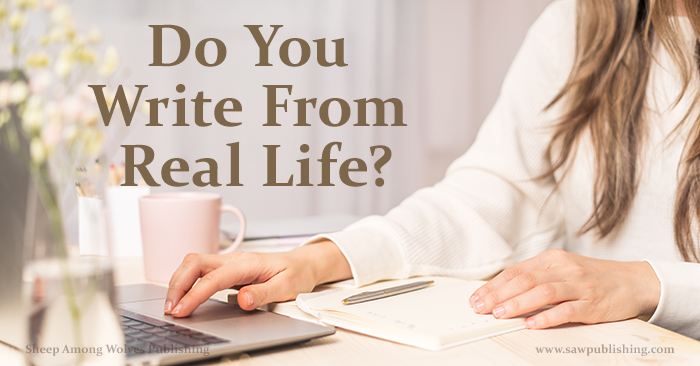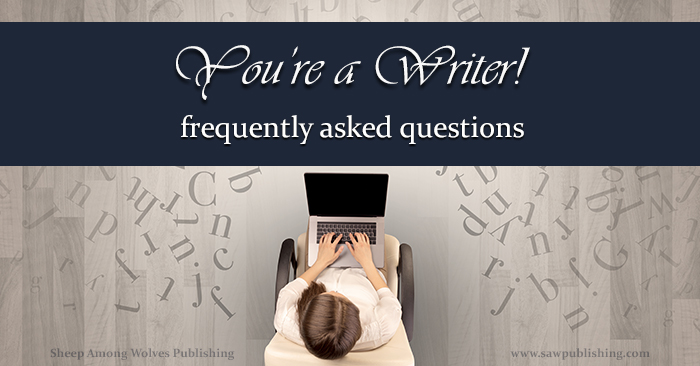Do You Write from Real Life?
 One of my most frequently asked questions as a writer is: “How much of your writing comes from real life?”
One of my most frequently asked questions as a writer is: “How much of your writing comes from real life?”
And the answer, boiled down to a nutshell, is: It depends.
It depends on the story, it depends on the characters, and maybe most importantly, it depends on what you mean by the question.
When people ask me if my stories come from real life, they don’t always mean the same thing.
Some of them are asking, “Are there real life incidents in your stories?” Others wonder if the whole narrative is a veiled autobiography (and I think a lot of them are secretly hoping it is). And still others want to know how I can write authentically about deep struggles and experiences that perhaps I’ve never personally known.
And for each of those questions, there’s a slightly different answer.
Question #1: Are There Real Incidents In Your Stories?
 Plain and simple: yes. Yes, there are. They aren’t on every page, or even in every book, and many of them are the small and meaningless details that just give a little pop of colour to the story, but yes, they’re most certainly there.
Plain and simple: yes. Yes, there are. They aren’t on every page, or even in every book, and many of them are the small and meaningless details that just give a little pop of colour to the story, but yes, they’re most certainly there.
For example, the bulk foods store where Cherish and Shayla work in Tomorrow Isn’t Promised, was loosely inspired by my own experiences as a cashier in a butcher shop. Details are obviously changed, but my general understanding of the setting was definitely influenced by real life. Or to go even more minute, after I started driving, I noticed myself using the mundane tasks of operating a car to punctuate internal or external dialogue in many different scenes. Often the real life details make excellent action beats, breaking up the dialogue and deeper themes of the story.
Question #2: Are Your Stories Autobiographical?
This is often what I hear when people ask me “do you write from real life?”—and sometimes, I feel a little badly (even while I’m also very grateful!) that the answer is a resounding “no.” Maybe someday I’ll have the courage to write an autobiography, but it hasn’t happened yet. As vulnerable as writing fiction can be, autobiography looks a lot more terrifying.
You see, when you release a book into the world it’s out there for everyone to see, comment on, and yes, at times scrutinize rather mercilessly. If this is true for fiction, it’s even more true for autobiography (even carefully veiled!) and I’m not sure I’m tough-skinned enough for that!
The one, itsy-bitsy, teeny-weeny, and I-hesitate-even-to-mention-it exception is a few broad details in the backstory to my Fellowship of Light series. I did indeed grow up in an Evangelical homeschooling family, I experienced a number of church transitions throughout my growing up years, and I ended up in a Mennonite church in my late teens. HOWEVER—and this is a big however—the incidents surrounding the Hall and Matthews families and their ongoing stories are completely fictional, including how they ended up where they ended up. (Trying hard to avoid spoilers!) Their story is not a disguised version of my own, but a fictional tale that is believable due to, but not based on, my own experiences.
Question #3: How Do You Write What You Don’t Know?
Whenever I suspect that someone is actually asking this question, it makes me a little uncomfortable. Partly because of my own humanity, and partly because it’s maybe the most vulnerable aspect of the whole question. I’m sure most people don’t mean it this way, but it can feel sometimes like they’re questioning the credibility of an author who writes about deep things she hasn’t actually been through.
And this is where I pull out a favourite quote I discovered in the past year that really expresses how I feel about this issue.
(Note: As I wrote this post, I searched high and low to find where I saved the quote, and I wasn’t able to locate it, so if anybody knows who to attribute it to, I would be very grateful for the information!)
“Write whatever you can imagine, but ground it in the emotions you know.”
I may not have been through the traumatic loss of a lover or a dear friend, but I know what grief feels like. I may not have been betrayed by everyone in my hour of deepest need, but I know what abandonment feels like. I know what it is to struggle and come out defeated, to love something and lose it, to face darkness and find out that you can keep on going long after you think you’re down and out. I can’t live all the lives I want to write about, but I have lived this one life long enough to understand that at its core, every life is the same. We face different challenges, but we experience the same emotions. And that’s where we come to my favourite part of the question.
Is There Anything Real About What You Write?
Yes! Yes, there absolutely is. The most important part of all, actually: the soul. When I write fiction, the part of myself that I scatter lavishly over every page is in fact the very deepest part of me and of the story—far deeper than the events or the plot. The emotions, the heartaches, and the universal struggles of humanity are the “real” parts of the fiction I write. So are the hope and the laughter and the belief in ultimate victory. The eternal truths of faith in God and hope of heaven are the things you can’t fake when you write fiction.
Ultimately, I don’t believe we can write anything that hasn’t already been a part of us, in some way at some time—even when we’re writing fiction. Imagination is only possible because we can compare what we’ve never experienced to something that we know and understand. Every time one of my characters longs or struggles, grieves or rejoices or stands in awe, it’s because—in some different place, at some different time, I have experienced something parallel. The lessons and revelations of every character arc have a little piece of my soul in them.
I don’t write about things I know, I write from things I know, and I believe it’s one of the best things I can offer to my readers—a little piece of me.
So do I write from real life? Yes—and no—and yes again. It all depends on which question you’re actually asking!
If you enjoyed this peek behind the scenes, you might also be interested in:


This was very well put! Thankfully, I haven’t been asked this question too many times, but I’m sure I will be.
Thanks, Laura! Yes, it’s one that seems to come up!
Thank you for sharing, Chelsea! I really enjoyed this.
Thanks, Bethany!